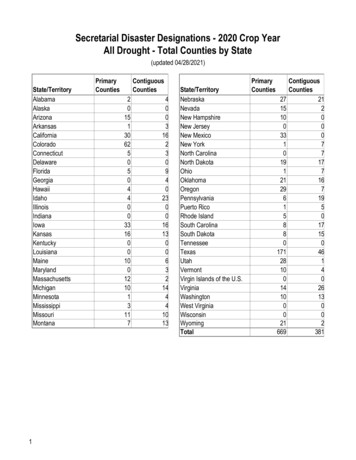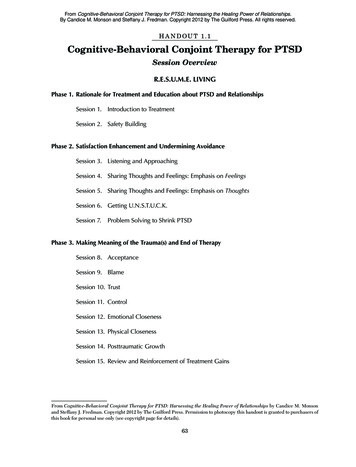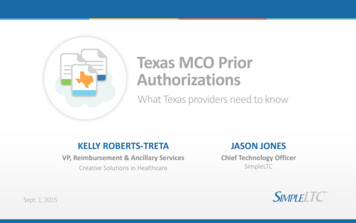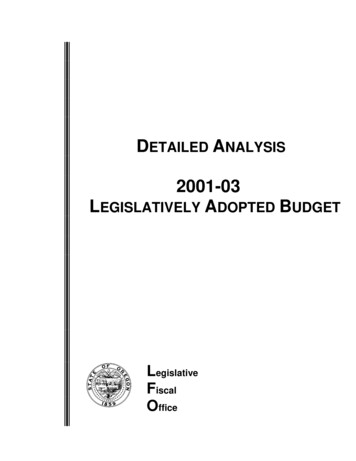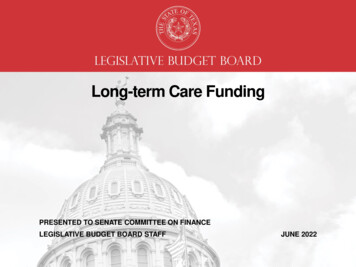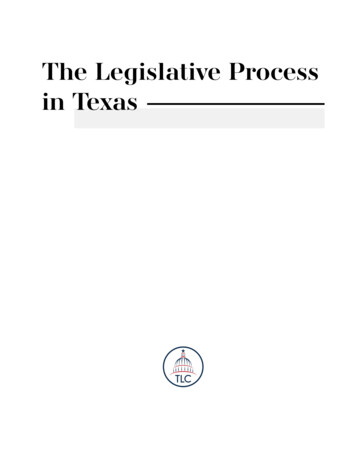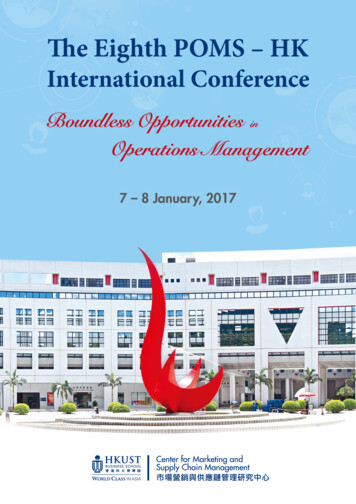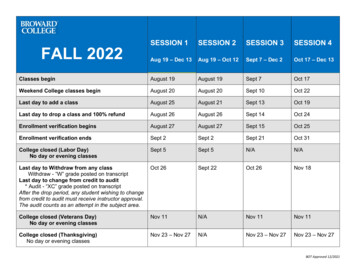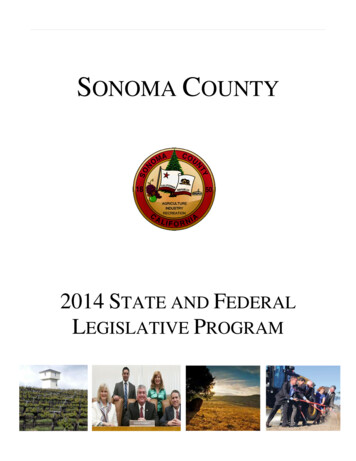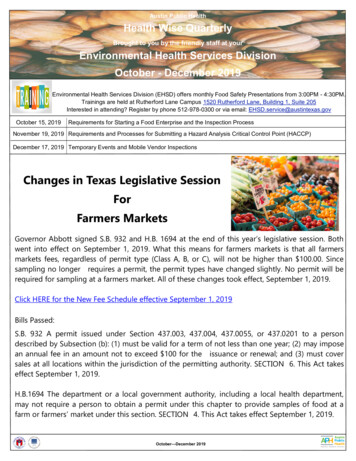
Transcription
Austin Public HealthHealth Wise QuarterlyBrought to you by the friendly staff at yourEnvironmental Health Services DivisionOctober - December 2019Environmental Health Services Division (EHSD) offers monthly Food Safety Presentations from 3:00PM - 4:30PM.Trainings are held at Rutherford Lane Campus 1520 Rutherford Lane, Building 1, Suite 205Interested in attending? Register by phone 512-978-0300 or via email: EHSD.service@austintexas.govOctober 15, 2019Requirements for Starting a Food Enterprise and the Inspection ProcessNovember 19, 2019 Requirements and Processes for Submitting a Hazard Analysis Critical Control Point (HACCP)December 17, 2019 Temporary Events and Mobile Vendor InspectionsChanges in Texas Legislative SessionForFarmers MarketsGovernor Abbott signed S.B. 932 and H.B. 1694 at the end of this year’s legislative session. Bothwent into effect on September 1, 2019. What this means for farmers markets is that all farmersmarkets fees, regardless of permit type (Class A, B, or C), will not be higher than 100.00. Sincesampling no longer requires a permit, the permit types have changed slightly. No permit will berequired for sampling at a farmers market. All of these changes took effect, September 1, 2019.Click HERE for the New Fee Schedule effective September 1, 2019Bills Passed:S.B. 932 A permit issued under Section 437.003, 437.004, 437.0055, or 437.0201 to a persondescribed by Subsection (b): (1) must be valid for a term of not less than one year; (2) may imposean annual fee in an amount not to exceed 100 for the issuance or renewal; and (3) must coversales at all locations within the jurisdiction of the permitting authority. SECTIONA6. This Act takeseffect September 1, 2019.H.B.1694 The department or a local government authority, including a local health department,may not require a person to obtain a permit under this chapter to provide samples of food at afarm or farmers’ market under this section. SECTIONA4. This Act takes effect September 1, 2019.October—December 2019
Congratulations to New and Promoted EHSD Staff!BE SO GOOD THEY CAN’T IGNORE YOU. Steve Martin Megan Carreon: Environmental Health Officer IHowdy! Megan was born and raised in Boerne, Texas. She graduated from the Texas Aggie Class of 2017 with aBachelor’s Degree in Nutritional Science. After college, Megan moved to Austin with her two fur-babies to work forthe City of Austin as a WIC Nutritionist. While working at WIC, Megan served the community by providing nutritioneducation and counseling to families with expecting mothers, infants, and young children. Recently, she switcheddivisions and is now working as an Environmental Health Officer to help protect the public from food-borne illnesses.Megan is very excited about this new position, and is grateful to have found a career where she can continue to helpothers.Jaemi Duran: Environmental Health Officer IJaemi grew up in Houston, TX and moved to Austin, TX in 2011 for school. She graduated from the University of Texasin 2015 with a degree in Nutrition. Go Longhorns! She has an identical twin sister who shows up to work for hersometimes. KIDDING! Jaemi has been blessed with a loving family. She does not have any pets at the moment butobsesses over everyone else’s. Jaemi loves taking on new challenges and accomplishing them. She is excited to fulfillher new role as an Environmental Health Officer.Nicole Kresse: Environmental Health Officer INicole grew up in Queens, NY where she was a serious student and competitive athlete. She practiced a variety ofsports such as gymnastics for 15 years, ice hockey, snowboarding and track and field. Upon graduating from RutgersUniversity with a Marketing degree in 2007 she pursued a career in animal welfare at the ASPCA. She worked her wayinto the veterinary field as a veterinary assistant and educator working for their mobile spay and neuter clinics andtraining technicians nationwide. When she moved to Austin in 2013 she began working at the Austin Animal Center,obtained a Veterinary Technology degree from Austin Community College in 2017 and became a Licensed VeterinaryTechnician. After 10 years of working in animal welfare she decided to pursue a career in Environmental Health. In herfree time she enjoys spending time with her dog Gonzo, bicycling, camping and riding motorcycles with her friends.Delencia McGraw: Customer Service RepresentativeDelencia is a native Austinite who loves to spend time with her family and travel. She has worked as a Customer ServiceRepresentative with Austin Energy since 2016, starting off as a contractor and becoming a permanent employee withCity of Austin in March 2018. She started with the Austin Public Health Department as a Customer ServiceRepresentative in June of 2019 and is thankful for the opportunity. Delencia is still adjusting to her new journey ofmotherhood and work but enjoys every minute of it.Nhien Nguyen: Environmental Health Officer IINhien graduated from the University of Houston in 2015 and started his food safety journey with Harris County PublicHealth in November 2015. He started his first day with Austin Public Health on July 22, 2019. Since then, he joined hisvery first softball team and played his very first official softball game. Nhien loves to play competitive games andcompete in obstacle courses. Occasionally, Nhien Snapchats with his good boy puppy, Lucky.Victor Solis: Customer Service RepresentativeVictor is originally from El Paso, Texas, the Sun City. He joined the Air Force and did a 6 year enlistment as an AvionicSystems Journeyman. Victor worked on F-15 Fighter Jets, A-10 Fighter Jets, and U-2 spy planes. During his time in themilitary, Victor got the chance to live in the U.K. for 3 years and then returned stateside to Florida. He achieved therank of an NCO, SSGT and did two tours of Operation Enduring Freedom and Operation Iraqi Freedom. Once Victorseparated from the military, he began working as a licensed Insurance Agent, living in the wonderful city of SanAntonio (Puro SA) for 8 years. While living in San Antonio, Victor began attending the University of Texas in SanAntonio for a Bachelor in Architecture. He eventually switched his major to International Relations, where he found hispassion in helping his local community. He feels honored to use his experience in serving the City of Austin. Hisfavorite activity is travelling, he likes rugby and as you can see hanging out with his pet, Gustav.October—December 2019
LEGAL COMPLIANCE INFORMATIONFor City of Austin Electronic Smoking DevicesCHAPTER 10-11ELECTRONIC SMOKING DEVICES (CHAPTER 10-11)Electronic smoking devices are prohibited in all locations where smoking is currentlyprohibited: most public places and work places.DEFINITION: ELECTRONIC SMOKING DEVICE means any product containing or delivering nicotine or any othersubstance intended for human consumption that can be used by a person to inhale or simulate smoking through the inhalationof vapor or aerosol from the product. The term includes any such device, whether manufactured, distributed, marketed, or soldas an e-cigarette, e-cigar, e-pipe, e-hookah, or vape pen, or under any other product name or descriptor, and any aerosol, liquid,or vapor used in such a device.ENFORCEMENT POLICY:(A) The director of Austin Public Health Department and the police chiefshall enforce this chapter.(B) The director and the police chief shall seek voluntary compliance withthis chapter before taking action to enforce the chapter.(C) A member of the public may file a complaint in a form acceptable tothe prosecuting attorney to enforce this chapter.PENALTIES:A person who violates this chapter commits a misdemeanor and shall beassessed a fine as follows:(1) not less than 100 for a first conviction;(2) not less than 200 for a second conviction within a 12-month period following the first conviction; and(3) not less than 500 for a third or subsequent convictionFor more information on the City of Austin Code Chapter 10-11: Electronic Smoking Devices, click HERE.Aaron Urbanek Photo CreditOFFICES CLOSED! Plan Accordingly. EHSD will be CLOSED on: Monday, November 11 for Veterans’ DayThursday and Friday, November 28 - 29 for ThanksgivingTuesday and Wednesday, December 24 - 25 for ChristmasWednesday, January 1 for New Year’s DayOctober—December 2019
September is Food Safety Education Month!Be a Food Safety Superhero!October—December 2019
HEMP Related InformationFrom the Texas Department of State Health Services (DSHS)On June 10, 2019, Governor Greg Abbott signed House Bill 1325 into law, to allow for the production,manufacture, retail sale, and inspection of industrial hemp crops and products in Texas. This includesproducts for human consumption that may contain cannabidiol, also known as CBD, as well as certainother parts of the hemp plant.HB 1325 requires the Texas Department of Agriculture (TDA) to first file a state plan to monitor andregulate the production of hemp in Texas, and have that plan approved by the United States Department ofAgriculture (USDA) before an agency can create the rules necessary to implement the rest of HB 1325.For more information on the USDA process, visit the USDA Hemp Production and Hemp ProductionProgram web pages. According to the USDA website, “it is USDA’s goal to issue regulations in the fall of2019 to accommodate the 2020 planting season. As required by law, USDA is committed to completing itsreview of [state] plans within 60 days, once regulations are effective.”The Texas DSHS will be working along with the TDA and Texas Department of Public Safety (DPS) toobtain required federal approvals and implement HB 1325.What is a consumable hemp product?A consumable hemp product is a food, drug, device, or cosmetic that contains industrial hemp or hempderived cannabinoids, including cannabidiol (CBD). These products may not contain more than 0.3 percentconcentration of tetrahydrocannabinol (THC).What is DSHS required to do under HB 1325?When the submitted TDA state plan is approved by USDA, HB 1325 requires DSHS to: Establish a manufacturing licensure program for consumable hemp products.Create a registration process for retailers selling consumable hemp products containing CBD.Work with DPS on random testing for consumable hemp products containing CBD sold at retail.Random testing will not occur until the retail registration process is established after the TDA stateplan approval.Implementation of HB 1325 will involve the development of rules, which will include a public input process.While DSHS rules development will begin before the TDA plan is approved, final rules cannot be completed until after the TDA state plan approval. Therefore, DSHS may only begin issuing licenses and acceptingregistrations after TDA's plan is approved by USDA and DSHS adopts rules consistent with the TDAapproved plan. The approved plan may impact the implementation of HB 1325, including rulesdevelopment.What is DSHS’ role?DSHS has oversight of food, drug, cosmetics and dietary supplement manufacturers, distributors andretailers, including those that may use or market hemp or cannabidiol (CBD) as an ingredient in those products. Local jurisdictions may also regulate retail sales of food, drugs, cosmetics and dietary supplements,but may not prohibit the sale of consumable hemp products.DSHS does not regulate an individual’s private possession or private use of any food, drug, cosmeticproduct or dietary supplement. Neither does DSHS administer the Texas Compassionate Use Act.For more information on Hemp from p-program/default.aspxOctober—December 2019
Know Your Pathogen:Texas Food Establishment Rules identifies 6 foodborne pathogens that require restriction or exclusion of foodhandling employees. These are Shiga toxin-producing E. coli, Hepatitis A, Nontyphoidal Salmonella,Norovirus, Shigella, and Salmonella typhi. The following information was collected from Centers forDisease Control and Prevention to educate and prevent foodborne illnesses in the communities served byAustin Public Health.Sources of Infection:People who are sick with shigellosis have Shigella germs in their stool (poop) while they have diarrhea and for up to a week or two after the diarrhea has gone away. Shigella is very contagious; just a small amount of germscan make someone sick. People could get sick by: Getting Shigella germs on their hands and then touching their food or mouth. This may happen after: Touching surfaces contaminated with germs from stool from a sick person, such as toys, bathroom fixtures, changingtables or diaper pails. Changing the diaper of a sick child or caring for a sick person. Eating food that was prepared by someone who is sick with shigellosis. Foods that are consumed raw are more likely to be contaminated with Shigella germs. Shigella germs can contaminate fruits and vegetables if the fields where they grow contain human waste. Swallowing recreational water (for example, lake or river water) while swimming or drinking water that is contaminatedwith stool (poop) containing the germ. Having exposure to stool during sexual contact with someone who is sick or recently (several weeks) recovered fromshigellosis.Symptoms:Symptoms usually last 5 to 7 days, but some people may experience symptoms anywhere from a few days to 4 or more weeks.In some cases, it may take several months before bowel habits (for example, how often someone passes stool and theconsistency of their stool) are entirely normal. People who are sick from Shigella infection usually start experiencing symptoms1 to 2 days after contact with the germ. Symptoms of shigellosis include: Diarrhea (sometimes bloody) Fever Stomach pain Feeling the need to pass stool [poop] even when the bowels are emptySome people with shigellosis will not have any symptoms.Diagnosis:Many kinds of germs can cause diarrhea. Knowing which germ is causing an illness is important to help guide appropriatetreatment. Healthcare providers can order laboratory tests to identify Shigella germs in the stool (poop) of someone who issick.Treatment:Most people will recover from shigellosis without treatment in 5 to 7 days. People who have shigellosis should drink plenty offluids to prevent dehydration. People with shigellosis should not use anti-diarrheal medication, such as loperamide (forexample, Imodium) or diphenoxylate with atropine (for example, Lomotil). These medications may make symptoms worse. Insome people, bismuth subsalicylate (for example, Pepto-Bismol) can help to relieve symptoms. Healthcare providers may prescribe antibiotics for some people who have severe cases of shigellosis.When to Contact Your Doctor:People with diarrhea should contact their healthcare provider if they have any of these symptoms: Fever Bloody diarrhea Severe stomach cramping or tenderness Dehydrated Feel very sick.People who are in poor health or who have immune systems weakened from diseases such as HIV/AIDS, or chemotherapy forcancer, are more likely to get sick for a longer period of time if they have shigellosis. They should contact their healthcareprovider if they think they have shigellosis to determine the best course of treatment.October—December 2019
ENVIRONMENTAL HEALTH SERVICES DIVISION CUSTOMER WALK IN HOURSLobby Hours Rutherford Lane Campus 1520 Rutherford Lane 7:45AM - 3:30PM Monday - FridayOne-Stop Shop 505 Barton Springs Road 8:00AM -12:00PM Monday - FridayMobile Vending Physical Permitting Inspections Rutherford Lane Campus1520 Rutherford Lane 7:45 AM - 11:00AM Tuesday and ThursdayEHSD is partnering with Austin 3-1-1 to handle all citizen complaints and environmentalinvestigations. To request services, get general assistance or submit a citizen complaint,dial 3-1-1 or 512-974-2000 if you are calling from outside the Austin service area.If you feel an inspection issue or complaint investigation has not been satisfactorily addressed, or to speak with a managerregarding administrative issues, please call us directly at 512-978-0300 between the hours of 7:45AM - 4:45PM Monday - Friday.Mailing Address: EHSD Post Office Box 142529, Austin, TX 78714Physical Address: Rutherford Lane Campus 1520 Rutherford Lane Building 1 Suite 205 Austin, TX 78754Email Address: EHSD.service@austintexas.govWeb Address: l-health-servicesFeedback: Please complete our online survey to help us better serve our customers: r 2019
December 17, 2019 Temporary Events and Mobile Vendor Inspections Changes in Texas Legislative Session For Farmers Markets Governor Abbott signed S.B. 932 and H.B. 1694 at the end of this year's legislative session. Both went into effect on September 1, 2019. What this means for farmers markets is that all farmers
